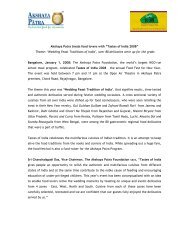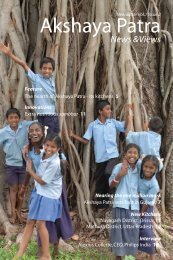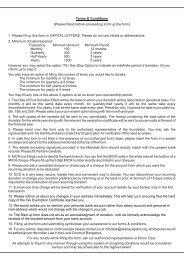The Top 100 NGOs 2013. - Akshaya Patra
The Top 100 NGOs 2013. - Akshaya Patra
The Top 100 NGOs 2013. - Akshaya Patra
Create successful ePaper yourself
Turn your PDF publications into a flip-book with our unique Google optimized e-Paper software.
Child & Youth<br />
Finance<br />
sPecial FeaTure sPecial FeaTure<br />
©chilD anD youTh Finance © gemma calDwell/aa © ycaB FounDaTion © PlaneTreaD<br />
© mamun mahmmuD mallik/Dam<br />
© soPhie JorDi/icJ<br />
72 73 74 75<br />
76<br />
77<br />
achieving Financial inclusion For <strong>The</strong> young Training reFugees To reBuilD <strong>The</strong>ir lives emPowering aT-risk youTh <strong>The</strong> PoP culTure liTeracy Program mulTi-Dimensional PoverTy alleviaTion a seminal acTor in human righTs<br />
NEW NEW NEW<br />
48 NEW<br />
11<br />
Ninety percent of young<br />
people worldwide lack access<br />
to basic financial services.<br />
Yet, financial inclusion and access<br />
is critical in developing financial<br />
literacy and building positive financial<br />
behavior over time. Established by the<br />
founder of Aflatoun, Child & Youth<br />
Finance International is pursuing<br />
an ambitious ‘spider in the web’<br />
model by bringing together a global<br />
movement of international stakeholders<br />
– from financial regulators, to banks,<br />
child rights groups and academia –<br />
dedicated to increasing the financial<br />
empowerment and security of children<br />
and youth. Simply by aligning the<br />
efforts of existing partners, it has<br />
already succeeded in reaching out<br />
to 18 million additional children – it<br />
is expected that this approach will<br />
build a global consensus on child<br />
friendly banking services and financial<br />
education.<br />
Asylum Access YCAB Foundation PlanetRead Dhaka Ahsania ICJ<br />
Fearing persecution or fleeing a<br />
crisis, refugees usually land first<br />
in a country near their own.<br />
<strong>The</strong>re, they often experience further<br />
hardships and marginalization.<br />
Providing legal assistance and helping<br />
refugees assert their rights in their<br />
first country of refuge, Asylum Access<br />
transforms the traditional approach of<br />
endless humanitarian handouts into<br />
a sustainable, empowering solution.<br />
Refugees find grassroots assistance<br />
to navigate the legal process. Asylum<br />
Access also trains refugees as translators<br />
and community legal advisors for other<br />
refugees, delivering lasting change. To<br />
further scale its work, the organization<br />
is developing a Refugee Rights Toolkit<br />
to help advocates customize the Asylum<br />
Access model to local contexts and<br />
launch their refugee legal aid project<br />
anywhere in the world.<br />
<strong>The</strong> gloBal Journal + January & FeBruary 2013<br />
Concerned with the increasing<br />
incidence of drug abuse<br />
and street crime amongst<br />
Indonesia’s youth, together with<br />
increasing high school dropout rates,<br />
Veronica Colondam established YCAB<br />
Foundation in 1999 to address issues<br />
of youth development. An abbreviation<br />
of an Indonesian expression translating<br />
to “loving the nation’s children,” the<br />
organization’s program consists of<br />
three connected activities: the primary<br />
prevention of risky behavior, including<br />
drug abuse and HIV/AIDS, through<br />
education and the adoption of a positive<br />
lifestyle; digital inclusion, English<br />
literacy and vocational centers; and<br />
seed capital for youth entrepreneurship,<br />
including micro loans and a job<br />
center for graduates. From reaching<br />
out to 2,000 youth per year in 1999,<br />
YCAB Foundation now benefits over<br />
400,000 and has expanded its model<br />
internationally.<br />
Illiteracy rates in rural India are<br />
amongst the world’s highest, and<br />
the lack of effective educational<br />
infrastructure makes it difficult to<br />
address such a persistent challenge.<br />
Hundreds of millions of people are<br />
either illiterate, or ‘neo-literates’ –<br />
possessing only rudimentary skills<br />
despite several years of primary school.<br />
Realizing the situation demanded<br />
out-of-the-box thinking, Brij Kothari<br />
devised a very simple, yet cost<br />
effective (and scalable) solution using<br />
‘Same Language Subtitling’ (SLS)<br />
– the practice of subtitling television<br />
programs, music videos and other<br />
audiovisual content drawn from popular<br />
culture in the same language as the<br />
audio track. This ‘karaoke’ approach to<br />
literacy provides crucial regular reading<br />
practice to over 200 million neoliterates,<br />
and has prompted another 270<br />
million to begin reading.<br />
Mission<br />
hQ locaTion: ne<strong>The</strong>rlanDs hQ locaTion: uniTeD sTaTes hQ locaTion: inDonesia hQ locaTion: inDia<br />
hQ locaTion: BanglaDesh<br />
hQ locaTion: swiTzerlanD<br />
Founded in 1958 by educationist,<br />
social reformer and spiritual leader<br />
Khan Bahadur Ahsanullah, Dhaka<br />
Ahsania Mission has since established<br />
itself as one of the largest <strong>NGOs</strong> in<br />
Bangladesh, implementing a range of<br />
diverse programs in the areas of health,<br />
education, agriculture, technology,<br />
human rights and climate change<br />
and disaster management focused on<br />
improving the quality of life and social<br />
inclusion of the urban poor. A key<br />
feature of the Dhaka Ahsania Mission<br />
approach is its network of ‘Community<br />
Learning Centers,’ which seek to<br />
instill a participatory dynamic and<br />
partnership with those benefiting from<br />
the organization’s initiatives, and have<br />
also been used as a platform to deliver<br />
piggy-backed ‘one stop service’ points in<br />
target communities.<br />
<strong>The</strong>gloBalJournal.neT<br />
82 83<br />
Comprised of an evolving standing<br />
group of 60 prominent judges<br />
and lawyers, the International<br />
Commission of Jurists focuses on<br />
promoting the rule of law worldwide.<br />
Originally funded by the CIA and<br />
established as a counter-point to the<br />
Soviet International Association of<br />
Democratic Lawyers, the organization<br />
has since discarded its ideological<br />
ties, instead focused on advocacy,<br />
policy work and technical assistance.<br />
Throughout a 60-year history, the<br />
International Commission of Jurists<br />
has remained at the forefront of human<br />
rights standards, including a key role<br />
in the creation of the International<br />
Criminal Court. From ensuring<br />
women’s access to justice in Botswana<br />
to highlighting violations of due process<br />
in Sri Lanka, it also works assiduously<br />
at the grassroots to build local capacity<br />
in the justice sector.





